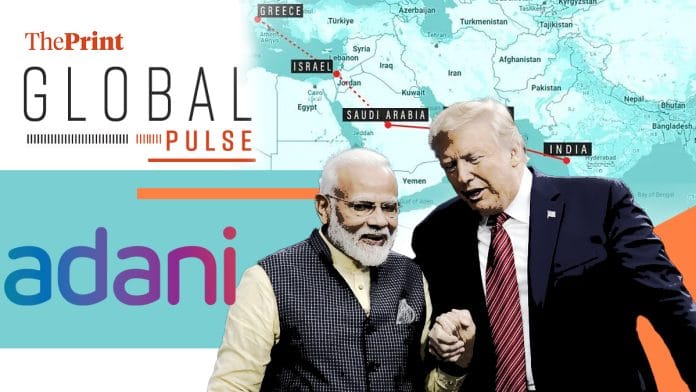New Delhi: As the world readjusts to the new Trump presidency, global media describes India as already signalling that it’s ready to adapt to his “transactional style” of diplomacy.
The Washington Post reports that India understands that a “preemptive and proactive” policy is the best way to approach Trump—and that such a conciliatory approach is a clever way to allow the Trump administration to put quick wins on the board and spare the Indian administration too much pain.
Trump and Modi cultivated a fairly close relationship during the US president’s first term, and New Delhi has been an important strategic partner in Washington’s efforts to counter Beijing.
And it looks like a new strategy is in place before Modi’s visit to the US, which Trump announced would happen “probably in February”.
There’s plenty to discuss. India has already said that it takes illegal immigration—a policy priority for the Trump administration—seriously. Foreign Minister Jaishankar, who had a prime spot at the presidential inauguration and was the first Indian official to meet Trump, already told reporters last week that the Indian government is “firmly opposed” to illegal migration. Modi and Trump also discussed repatriating illegal immigrants on their phone call earlier this week.
Indian officials have also indicated that India is interested in ramping up energy cooperation with the US, especially with Trump signing an executive order expanding American oil and gas drilling operations.
These two concessions are the first steps towards larger economic compromises, the Post reports. Trump has expressed irritation over Indian protectionism and high tariffs, and working towards a fair bilateral trade relationship is something that “New Delhi is eager to signal flexibility” over, the Post reports.
“The perception in New Delhi is that Trump has “much more control this time,” requiring other countries to “take him more seriously,” the Post writes. “New Delhi is also hoping the new president will help smooth over lingering frictions from the Biden administration in the aftermath of two politically explosive indictments.”
The indictments—one over the murder-for-hire plot and the other over Adani—have left a bitter taste in India’s mouth. In fact, the Adani indictment could be detrimental to the fledgling world order that was slowly being cobbled together in response to a growing China.
Forbes ran a column about how the US is shooting itself in the foot with the Adani indictment—picking that fight deals a blow to “stability in the Middle East, to the economy of Israel, to an entire global strategic confederation benefiting the West”.
“America and Europe’s great hope is India for countering China’s meticulously thought-out and geostrategically ultra-coherent global outreach. India is a natural choice due to its size and place. The idea—a straightforward one on the face of it—is to empower a rival to China in Asia, one that will become a competitor in trade routes from Asia to the world, especially via strategic zones like the Middle East,” the Forbes column says.
The issue it zeroes in on is IMEC, the Indo-Middle East-Europe Economic Corridor, launched in 2023. IMEC is the counter to China’s Belt and Road Initiative, and as a multilateral tool it interfaces with the Quad, the Abraham Accords, and the Middle East. IMEC is a crucially important tool, the column says, both from the strategic and economic standpoint.
And this is where the Adani indictment comes into play: not only is the Adani Group a pillar of the Indian economy, the column says, but it also has various degrees of ownership in ports along the IMEC route.
“This column is not about to adjudicate the merits of a complex legal case but suffice to say the US Justice Department has any number of priority legal cases to pursue. That it decided to launch this one when it did, just before the US election, for offenses committed outside the US, must raise eyebrows, knowing it will take that much longer to resolve,” the column says.
Also read: America has changed. Bigger question now is whether institutions can withstand his punches
The Financial Times reports that India and the US are exploring a deeper defence partnership, with Trump pushing Modi to buy more American-made weapons.
“Trump’s requests came as India, long the world’s largest arms importer, has been seeking to diversify its weapons suppliers beyond Russia. It has leaned on the US, along with other countries such as France, to close a gap in military technology and preparedness with regional rival China,” reports FT. “Modi has also pushed India’s military to support domestic arms manufacturers, part of his ambition for the defence and aviation industries to help make the country a global manufacturing power. Modi has set a target of $35bn for domestic defence production by the end of the decade, up from nearly $20bn last year.”
New Delhi needs to up its military capabilities if it wants to counter China. Trump and Modi’s phone call, incidentally, took place while foreign secretary Vikram Misri was in Beijing earlier this week.
The meeting was a success, according to Global Times. “The two sides reached consensus on multiple issues,” a story says. “The two sides agreed to carry out active interactions at all levels on bilateral and multilateral occasions, strengthen strategic communication, and enhance mutual political trust.”
The article reports that China stressed the importance of having a “long term perspective” when it comes to Indo-China relations. Bringing a stable relationship back on track, Global Times reports, requires “actively” advancing exchanges and practical cooperation with a “candid and constructive attitude”, guiding public opinion in a “positive way”, enhancing mutual trust, and “properly” handling differences.
(Edited by Zinnia Ray)






